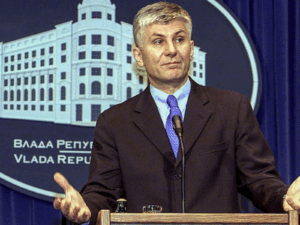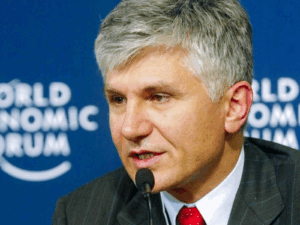Now Reading: Shradhanjali to Zoran Đinđić
-
01
Shradhanjali to Zoran Đinđić
Shradhanjali to Zoran Đinđić

Zoran Đinđić—Legacy of Serbia’s Reformist Prime Minister (1952–2003)
Introduction:
Zoran Đinđić was not just a politician but a visionary leader whose whole life was devoted to building a democratic, modern Serbia. He was the first reformist prime minister of Serbia after the fall of Slobodan Miloševic, who advocated for bold changes, European integration, and a better future for the rubes in the country. Tragically murdered, but whose memory survives to become a beacon of hope and to inspire courage and transformation.
Early Life and Background
Zoran Đinđić was born on August 1, 1952, in Bosanski Šamac in what was then Yugoslavia. His father was an officer in the Yugoslav People’s Army, and he spent his growing years in Travnik in childhood and later in Belgrade.
He attended the Ninth Belgrade Gymnasium and studied philosophy at the University of Belgrade, graduating in 1974.
In 1974, the regime punished him for his independence in organising student movements. Zoran Đinđić escaped Yugoslavia, thanks to international support, including former German Chancellor Willy Brandt, to further studies in West Germany.
His dissertation on Franz Brentano and the theory of judgement was supervised by Jürgen Habermas at the University of Konstanz and completed in 1979; it was drawn under the powerful influence of Habermas, and this philosopher was to wield a lasting influence on him.
Return to Yugoslavia & Academic Career
His doctoral studies ended with Đinđić coming back to Yugoslavia and starting as a lecturer of philosophy at the University of Novi Sad. During the 1980s, he wrote essays and reviews for some of the influential journals in his area and became an ally of the Praxis school of critical social thought.
Founding of the Democratic Party & Opposition Activism
Đinđić co-founded the Democratic Party (DS) in 1989, Serbia’s first opposition party. It took him until 1994 to rise through the ranks to become a party president, executive committee chair, and finally president of the party that year. By the time of the 1990s, he was already a leading critic of Slobodan Milošević, damning nationalism along with its democratic reforms and pluralism.
Mayor of Belgrade & Role in 1990s Protests
The Last Time Someone Tried to Amend the Constitution in 1996
After long periods of political inertia, in late 1996, DS, along with its allies, took a clear majority in Belgrade at the local elections. It was in February of the next year that Đinđić took office as mayor, by far one of the earliest democratic victories after years.
Read revolutionary literature—Tilak, Lenin, Marxist texts—and wrote for Sikh‑Punjabi/Urdu newspapers under socialist thought.
Zoran Djindjic A month or so later, however, he was removed from the post by a regime-controlled assembly, triggering further protests and amplifying the opposition momentum.
About ten years ago, the last time someone tried to make changes to the Constitution was in 1996.
Fall of Milošević & Rise to Prime Minister
And thus, by the mid-1990s, Đinđić was one of the foremost organisers of the broad opposition to Milošević. After the October 5, 2000, Bulldozer Revolution and subsequent elections in December, the DOS coalition won a convincing victory.
He became the Prime Minister of Serbia on January 25, 2001, in charge of the first freely elected government after the fall of Milošević.
Reform Agenda and Key Achievements
As prime minister (2001–2003), Đinđić launched major reforms:
Resumption of cooperation with the ICTY, including extraditing Milošević to The Hague despite internal opposition


Launching Operation Sabre (Sablja) in March 2003, targeting organised crime. Over 11,000 arrests followed his assassination, as a state of emergency was implemented
He quickly earned a reputation as Serbia’s “reformist prime minister” and a symbol of democratic transition
Assassination and Aftermath
Zvezdan Jovanović, who belonged to the elite group called Red Berets and the Zemun criminal clan, killed Đinđić on March 12, 2003, in front of the Serbian government building in Belgrade.
The state of emergency was declared. The state emergency was in effect from March 12 to April 22, 2003.
Operation Sabre then began, as a means to arrest and prosecute prime suspects, including Dušan Spasojević and Milorad Ulemek
Because of Đinđić’s demise, the position for the time being was assumed by Zoran Živković, acting prime minister.
Legacy & Continued Influence
What remains in modern Serbian history is the Zoran Đinđić legacy:
He is best remembered today as a symbol of hope and firm reform. Commentators often compare him to a Serbian Kennedy—a magnetic leader whose life was cut short by forces resisting change.
Campaigns in the public memory, annual celebrations on 12 March, and exhibitions in the Zoran Đinđić Virtual Museum and Foundation keep living with his ideals.
Conclusion: Why Zoran Đinđić Matters
Đinđić stood at the crossroads between Serbia’s painful past and its hopeful future, leading an entire historic transition in the aftermath of Milošević’s fall.
His life was tragically cut short, but his agenda for reform, pro-European stance, and moral courage continue to inspire.
His story finds a compelling fit on Shradhanjali.com in your series honoring democratic figures and victims of political violence around the world.






